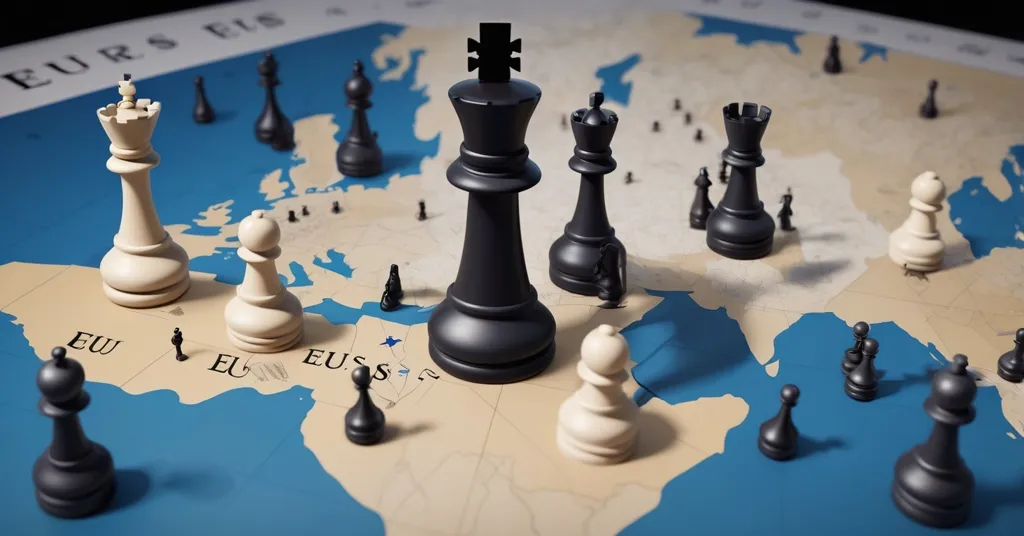EU Plans $113B Retaliatory Tariffs on US Amid Trade War Escalation

EU Escalates Trade War, Targets $113 Billion in US Goods with Retaliatory Tariffs
The European Union is set to intensify its trade dispute with the United States, preparing to impose retaliatory tariffs on $113 billion worth of US goods. This move comes in response to the US’s imposition of a 25% tariff on European steel, aluminum, and cars, and a 10% tariff on nearly all other EU goods, which might soon rise to 20%. European Trade Commissioner Maros Sefcovic has made it clear that the EU will not tolerate unfair trade practices, stating, “All options remain on the table here […]. While the EU’s clear preference was to negotiate a solution with the United States, he said Washington now needed to show its readiness to make progress towards a fair and balanced agreement.”
- EU plans $113B in retaliatory tariffs on US goods
- US imposes 25% on EU steel, aluminum, cars; 10-20% on other goods
- 70% of EU exports to US affected, potentially rising to 97%
- EU to announce measures to member states by Wednesday
- Negotiations slow, EU proposes increased US LNG, soybean imports
The EU’s approach is twofold: it aims to pressure the US into a more favorable trade agreement while carefully managing the impact on its own supply chains. By Wednesday, the EU will announce these proposed measures to its member states, initiating a month-long consultation period. This strategy is not just about retaliation but also about opening pathways for negotiation, exerting maximum pressure on the US while ensuring minimal disruption to European industries.
Currently, 70% of EU exports to the US are impacted by these tariffs, with the potential for this to rise to 97%, affecting €549 billion worth of goods. This looming increase could significantly disrupt European industries and economies, prompting the EU to explore various avenues to mitigate these effects. Retaliatory tariffs, or counter-taxes imposed in response to another country’s taxes, are a key part of the EU’s strategy to level the playing field.
In an effort to de-escalate tensions, the EU has proposed increasing imports of US liquefied natural gas (LNG) and soybeans. Liquefied natural gas, or LNG, is natural gas that has been cooled to a liquid state for easier storage and transportation. However, progress has been slow, and the US appears more focused on the EU’s tech taxes and value-added tax than on these trade proposals. This discrepancy in priorities further complicates negotiations, leaving the EU to prepare for a potentially prolonged trade war.
The EU’s readiness to impose these retaliatory tariffs is a direct response to what they perceive as the US’s assertive trade policies under President Trump. These policies have escalated tensions between the two economic giants. The current trade war reflects broader protectionist strategies that have rippled across global trade. The EU is carefully calibrating its response to minimize domestic economic fallout while pressuring the US for a more equitable trade agreement.
As the EU and US continue this economic tug-of-war, the impact on global trade remains a significant concern. The EU’s strategic responses, such as potential free trade agreements with other nations and internal market reforms, could provide a buffer against the US tariffs. Additionally, the EU is considering World Trade Organization safeguard measures, which are emergency protections to help industries facing sudden competition, to protect its industries from import surges.
Despite the seriousness of the situation, there’s a bit of irony in the air. The world’s largest economies are essentially playing a high-stakes game of economic chess, with tariffs as their pawns. It’s a game where everyone loses a bit, but nobody wants to be the first to blink.
Key Takeaways and Questions
- What are the current US tariffs on European goods?
The US has imposed a 25% tariff on European steel, aluminum, and cars, and a 10% tariff on nearly all other European goods, with a potential increase to 20%.
- How will the EU respond to these US tariffs?
The EU plans to impose retaliatory tariffs on about $113 billion in US goods if negotiations fail, and will announce these measures to member states by Wednesday.
- What is the EU’s stance on trade negotiations with the US?
The EU is open to negotiations but will not accept unfair trade deals, as stated by European Trade Commissioner Maros Sefcovic.
- What other trade proposals has the EU made to the US?
The EU proposed increasing imports of American liquefied natural gas and soybeans, though the US has shown more interest in the EU’s tech taxes and value-added tax.
- How will the EU’s retaliatory measures affect its supply chains?
The EU aims to maximize pain for the US while ensuring minimal impact on its own supply chains.
The ongoing trade war between the EU and the US, driven by tariffs and retaliatory measures, underscores the complexities of global trade dynamics. As both sides navigate these choppy economic waters, the outcome will likely have far-reaching implications for international trade relations and economic stability. For more information on the trade war, you can refer to Wikipedia, Reddit discussions, and Quora insights.



